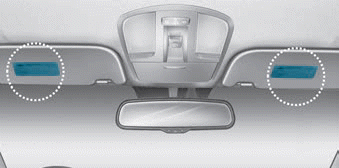Hyundai Ioniq: Autonomous Emergency Braking(AEB) System / Components and components location
Hyundai Ioniq (AE) 2017-2025 Service Manual / Brake System / Autonomous Emergency Braking(AEB) System / Components and components location
| Components |
The following is the configuration of the AEB system.
| – | Detection device (radar and camera) that can recognize potential obstacles in the front. |
| – | Human-Machine Interface (HMI) to warn driver or change settings. |
| – | Braking system to automatically brake the car |
AEB, contrary to SCC (Smart Cruise Control), has to work on a stationary car so the system uses the Fusion Target system to combine radar with camera.

 Description and operation
Description and operation
Description–
AEB system is designed to help avoid a potential collision or reduce its impact when drivers applies inadequate, delayed or no brakes at all to avoid a collision...
Other information:
Hyundai Ioniq (AE) 2017-2025 Owner's Manual: Check Lane Keeping Assist (LKA) system, Check Driver Attention Warning (DAW) system,
Check Lane Keeping Assist (LKA) system (if equipped) Either message is displayed if there is a problem with the Lane Keeping Assist (LKA) System. Have the vehicle inspected by an authorized HYUNDAI dealer. Check Driver Attention Warning (DAW) system This warning message is displayed if there is a problem with the Driver Attention Warning (DAW) system...
Hyundai Ioniq (AE) 2017-2025 Service Manual: SRS Control Module (SRSCM). Description and operation
Description• Supplemental Restraint System Control Module (SRSCM) determines whether and when to deploy air bag module, seat belt pretensioner (BPT) and emergency fastenig device (EFD).• It supplies the air bag module with the power required to deploy the module or the BPT and EFD...
Categories
- Manuals Home
- 1st Generation Ioniq Owners Manual
- 1st Generation Ioniq Service Manual
- Smart Cruise Control System
- Theft-alarm System
- How to Disconnect Normal Charger
- New on site
- Most important about car
Air Bag Warning Labels

Air bag warning labels, required by the U.S. National Highway Traffic Safety Administration (NHTSA), are attached to alert the driver and passengers of potential risks of the air bag system. Be sure to read all of the information about the air bags that are installed on your vehicle in this Owners Manual.
Copyright © 2025 www.hioniqae.com

